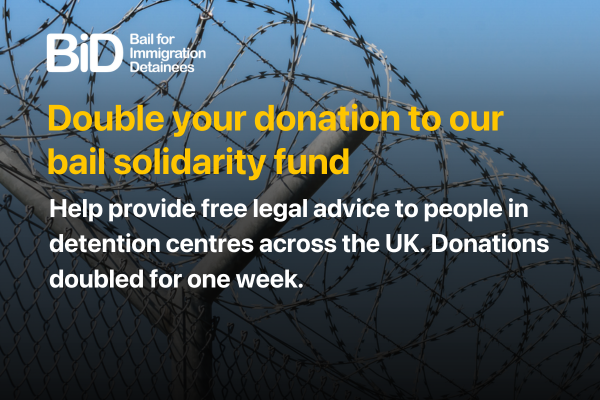Formal legal action has today been launched against the UK government in an attempt to force it to designate security company G4S a ‘High Risk’ strategic supplier in the wake of a number of catastrophic failings.
Lawyers from Leigh Day, who are acting on behalf of charity Bail for Immigration Detainees (BID), have begun legal action to hold the government to account after its refusal to confirm whether G4S has been designated a ‘High Risk’ strategic supplier.
BID argues that a catalogue of serious failings by G4S, many of which were highlighted in a Panorama documentary last year entitled: ‘Britain’s Immigration Secrets,' should result in G4S being placed under increased scrutiny by being designated ‘High Risk’ by the government.
G4S currently benefits from a number of multi-million pound contracts with the government, operating two immigration detention centres, five prisons and one secure training centre. As such, they are a ‘strategic supplier’ to the government.
The Panorama documentary highlighted a series of failings at Brook House Immigration Removal Centre (IRC) in West Sussex including the maltreatment of detainees by staff, a widespread culture of disrespect and the falsification of incident reports in order to cover up misconduct.
Panorama’s revelations about Brook House IRC are the latest in a long line of allegations involving G4S in the running of detention facilities, including the very similar allegations made against staff at Medway Secure Training Centre in January 2016.
Celia Clarke, BID’s Director, said: “Time and time again G4S’s conduct in its management of government contracts has been found wanting. The mounting list of scandals must be seen as systemic failings by the government, not one-off incidents”.
“We have seen evidence of serious maltreatment of detainees by staff at Brook House IRC and yet there appears to be no recognition of this by the government.
“Bringing a legal challenge against the Cabinet Office for failing to designate G4S a ‘High Risk’ strategic supplier will make it harder for the government to award G4S future contracts and, ultimately, help prevent the future maltreatment of detainees. We have sent a pre-action letter of claim to the Cabinet Office and are awaiting their response.
BID is requesting a protective costs order to limit its costs in bringing this action but is hoping to fund those costs through CrowdJustice https://www.crowdjustice.com/case/highriskg4s
Under government policy, a strategic supplier can be designated ‘High Risk’ if there is evidence of repeated concerns regarding under-performance and mismanagement in the delivery of the services they are contracted to provide. However, the Cabinet Office refuses to even confirm if G4S has been designated ‘High Risk’ in line with that policy.
“That people are subjected to immigration detention at all is abhorrent. That they are subjected to physical and verbal abuse while incarcerated is utterly unacceptable. It is time the government stopped rewarding a company with a record of failure and mistreatment with new contracts, and no increased scrutiny on their questionable practices,” added Ms Clarke.
Benjamin Burrows from law firm Leigh Day, who is representing BID, said: “The question of whether it has been designated as ‘High Risk’ has important consequences for G4S as well as for those other private companies seeking government contracts to run detention facilities. It is an important tool in providing accountability and ensuring the welfare of detainees and prisoners matters.
“Such a designation will mean G4S’s existing contracts with the government will be subject to closer monitoring and review. Furthermore, it will have the effect that G4S is less likely to be awarded future contracts by the government. It will also act as a warning to other companies that the welfare of detainees must be taken seriously and failures will carry serious consequences.”








